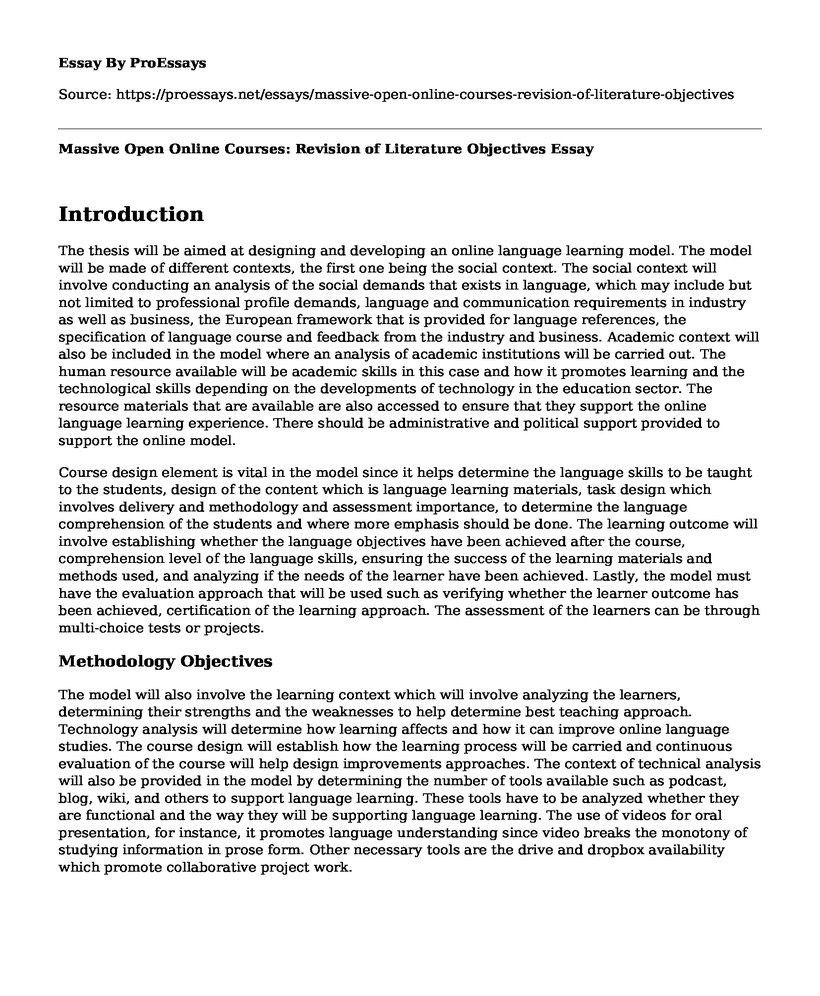Introduction
The thesis will be aimed at designing and developing an online language learning model. The model will be made of different contexts, the first one being the social context. The social context will involve conducting an analysis of the social demands that exists in language, which may include but not limited to professional profile demands, language and communication requirements in industry as well as business, the European framework that is provided for language references, the specification of language course and feedback from the industry and business. Academic context will also be included in the model where an analysis of academic institutions will be carried out. The human resource available will be academic skills in this case and how it promotes learning and the technological skills depending on the developments of technology in the education sector. The resource materials that are available are also accessed to ensure that they support the online language learning experience. There should be administrative and political support provided to support the online model.
Course design element is vital in the model since it helps determine the language skills to be taught to the students, design of the content which is language learning materials, task design which involves delivery and methodology and assessment importance, to determine the language comprehension of the students and where more emphasis should be done. The learning outcome will involve establishing whether the language objectives have been achieved after the course, comprehension level of the language skills, ensuring the success of the learning materials and methods used, and analyzing if the needs of the learner have been achieved. Lastly, the model must have the evaluation approach that will be used such as verifying whether the learner outcome has been achieved, certification of the learning approach. The assessment of the learners can be through multi-choice tests or projects.
Methodology Objectives
The model will also involve the learning context which will involve analyzing the learners, determining their strengths and the weaknesses to help determine best teaching approach. Technology analysis will determine how learning affects and how it can improve online language studies. The course design will establish how the learning process will be carried and continuous evaluation of the course will help design improvements approaches. The context of technical analysis will also be provided in the model by determining the number of tools available such as podcast, blog, wiki, and others to support language learning. These tools have to be analyzed whether they are functional and the way they will be supporting language learning. The use of videos for oral presentation, for instance, it promotes language understanding since video breaks the monotony of studying information in prose form. Other necessary tools are the drive and dropbox availability which promote collaborative project work.
Model Objectives
To obtain information about the Massive Open Online Courses (MOOCs), two digital course books teaching English and online teaching and learning pages. The course books will set a direction of what will be followed during the online studies, thus is designing a course outline. There are the pages which will be used for teaching and learning; they have to be identified in the case since they will help make it clear where the study materials will be found. There are other open online courses which can also be used by the students, and they are massive thus providing a wide range of knowledge to study English.
The other aim will be analyzing the materials available and the surveys done by students to extract general information. It will be necessary when the teaching units of the online language are being modeled. All the materials that have been used previously will act as a guide to make sure that no important decision is left behind. It will also help determine the best tool that will be used for the second language learners. It is necessary to establish the structure provided by MOOCs, the timing and relevant techniques which will cover the requirements of the modern learners. The linguistic skills attained from online studying have to be provided in a balanced way, ensure that students benefit from all approaches. The model should make sure no relevant materials should be left out to achieve all the learning objectives.
Results Objective
After the analysis, the next objective would be interpreting the surveys, the MOOCs and Web pages, quantitatively and qualitatively. It will help determine the most reliable approach of studying that should be used, especially with the second language learners. It will also guide the educators on the best materials to use, how to analyze them and the shortcoming of every resource to make sure that any mistakes are corrected, and only the best information is used for language teaching. The analysis of the materials will also assist in crafting conclusions that are well established, depending on the course outlines and the learning materials used. Once the mentioned objectives are achieved, the educator will be able to start the online language course without any hindrances.
Cite this page
Massive Open Online Courses: Revision of Literature Objectives. (2022, Jun 19). Retrieved from https://proessays.net/essays/massive-open-online-courses-revision-of-literature-objectives
If you are the original author of this essay and no longer wish to have it published on the ProEssays website, please click below to request its removal:
- Why High Schools Should Look To Implement A Smartphone Ban? - Essay Sample
- Research Paper Example on Child Development
- Importance of Security Personnel in Schools Essay Example
- Essay Example on Idiolect and Sociolects: The Unique Way We Speak
- Essay on Williams Mc Tomkins: 6yo Observation of Middle Childhood
- For-Profit Colleges: Quality Education, Positive Returns for Shareholders - Essay Sample
- Paper Example on Nostalgic Fishing Vacation on a Sunny Day







